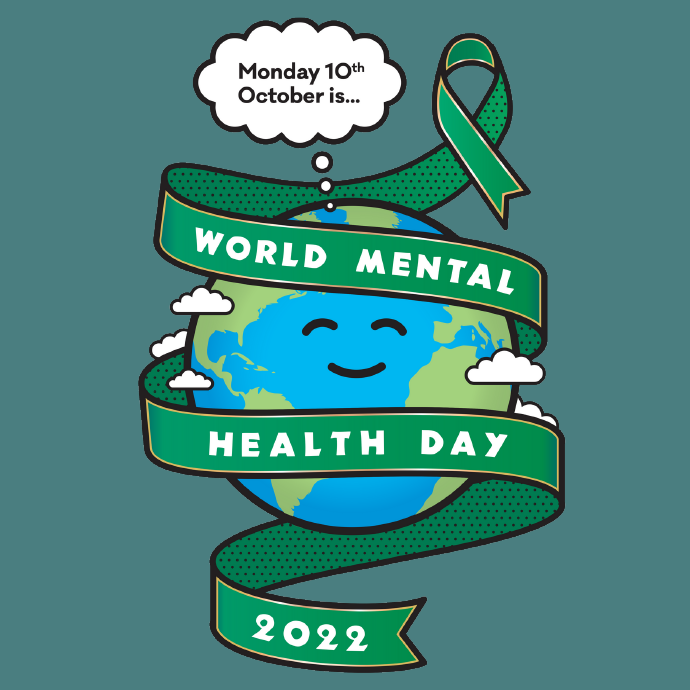Mental health is a global issue that affects us all. That’s why, in order to raise awareness and break the stigma around the topic, every 10th of October is World Mental Health Day.
This year’s theme is ‘Make mental health & wellbeing for all a global priority’. With that in mind, we want to take this opportunity to have a look at why Mental Health Day is important and what you can do to protect your own mental health and that of the people around you.
What is mental health?
Mental health is determined by individual, social and structural factors and the way these factors interact. It’s our mental health that allows us to have social relationships, make decisions, learn, work, realise our abilities and cope with stressful situations. It’s crucial to our development and affects every aspect of our lives.
How people experience mental health is very personal and it means something different to everyone.
Why is Mental Health Day important?
According to the World Health Organization, in 2019 one in eight people were living with a mental health condition. Since then, it’s estimated that this number has risen to as much as one in four, with most of these people experiencing anxiety or depression. The pandemic has, amongst many other things, led to a global mental health crisis which has added a lot of stress and uncertainty to people’s lives.
Yet, mental health is still not treated with the same importance as physical health. Services and funding are difficult to come by, especially in low- and middle-income countries. Across the globe, there is not nearly enough education and awareness around mental health topics.
The current cost of living crisis means that for many people, their mental health gets pushed down even further on the list of priorities. Since mental health is fundamental to our financial, emotional and social wellbeing, it’s important that we change this. Mental Health Day is a great opportunity to remind ourselves and others of the importance of raising more awareness around mental health, improving the access to care and breaking the stigma.
What can I do this Mental Health Day?
We all have a lot going on, so our mental health is often not given the attention it deserves. This October, let’s take some time to think about what we can all do to make global changes.
1. Learn and grow
The first step is to create a positive and judgement-free mental health culture. We’re all learning, so being able to openly talk about mental health is crucial. By educating yourself and others you can open up these conversations around you. If you want to know more about a specific mental health topic, you can read a book or watch a documentary that you can then recommend and discuss with friends, family or colleagues. Here are some suggestions for books on mental health.
2. Take care of your mind and body
When things get busy and stressful, we often start neglecting our self-care. Make sure you give yourself time to refocus, whether that’s by taking long walks, doing breathing or yoga exercises, gardening or cuddling up with a book. Don’t wait until you have time to do the things that make you feel at peace, because there will always be something else to do instead. Actively make time for these moments.
It’s no secret that our diets can positively or negatively affect our mental wellbeing. When we’re not feeling great, we start caring less about having regular and healthy meals. However, in those moments it’s actually even more important to focus on nutrition. Even something as simple as making sure that you eat breakfast every morning, can make a difference. You can also try to plan your meals and go grocery shopping at the start of each week, so you don’t end up skipping meals or reaching for a quick snack.
3. Check in on your loved ones
We get it, life gets hectic. But regularly taking the time to have a conversation with a friend, family member or colleague and being in the moment without any distractions, will make both of you feel valued and listened to.
The relationships in your life are important, so reach out to your loved ones and ask them how they’re doing. It’s so simple and it only takes a couple of minutes, yet to someone who is going through a difficult time, it can mean the world.
4. Know your own boundaries
And don’t be afraid to express them. The world around us will keep turning and there will always be more work to do, so it’s your responsibility to respect your own time and needs the same way you would someone else’s. Don’t sacrifice your mental health.
One thing that can really help with this is journalling. Keep track of how you’re feeling about your work-life balance by giving it a number out of 10 every week and write down a summary of how the week went. That way, when you notice your weekly score starts to go up or down, you can easily see what caused this, what’s going well and what needs to change.
5. Take mental health seriously
If a friend broke their arm tomorrow, you probably wouldn’t expect them to be doing somersaults a week later. It would be considered normal for them to need rest, get professional help and listen to their body. Mental health conditions may not always be visible, but they can have long-term effects the same way physical conditions can. Therefore, getting the right treatment and care is just as essential. By treating mental health with the same level of understanding, we can all send the message that there is no room for stigma and judgement.
6. Support a cause
Everyone should have access to mental health support, no matter their geographical or financial situation. If you want to contribute, there are many organisations worldwide that could use your help. In the UK, there is Mind, The Mental Health Foundation or Young Minds. Donations help provide essential mental health care to those who need it.
7. Remember you are not alone
Having good and bad times is what makes us human. Although it may not seem like it, there are many people who are experiencing something similar. It takes courage to notice that you are going through a difficult time and that you need support. Remember that experiencing emotions and feeling deeply is what makes you a loving, empathetic person. So don’t be afraid to reach out to people, get professional help if you can and prioritise your mental health.
8. Show your colleagues that you care about them
Praising a colleague for their hard work or just thanking them for being who they are, can make that person’s day. Recognition is incredibly important to our mental health in the workplace. So why not celebrate a colleague by sending them an ecard and a personalised message? We just know it will make both of you smile!
 Klara Owens
Klara Owens
